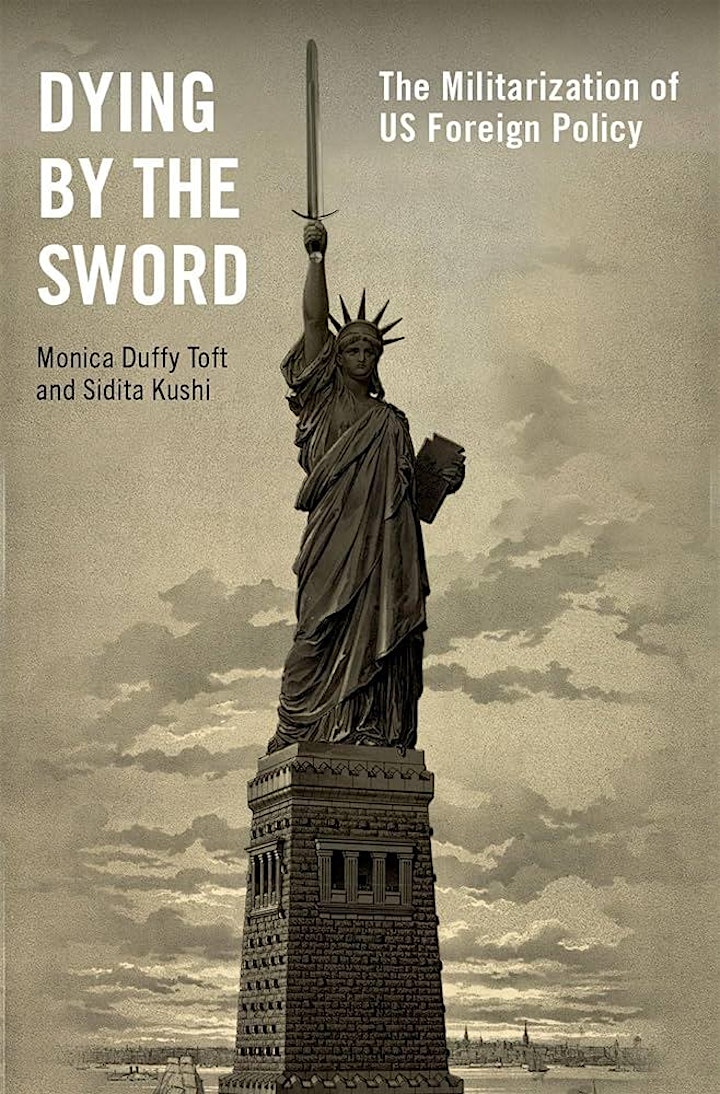Join us for this installment of our popular Chat & Chowder series, featuring Sidita Kushi, Assistant Professor of Political Science at Bridgewater State University, and Monica Duffy Toft, Academic Dean, Professor, and Director of the Center for Strategic Studies at The Fletcher School at Tufts University, to discuss their book, Dying by the Sword: The Militarization of US Foreign Policy.
Chat & Chowder programs are an excellent opportunity to engage with expert speakers and to network with other globally-oriented participants in an informal environment. Each event features a presentation, audience Q&A, dedicated time for networking, and (of course!) a selection of chowders and beverages.
Thanks to the generous support of The Lowell Institute, Chat & Chowder is now free of charge for all participants (Zoom live-streams remain free as well). We sincerely appreciate The Lowell Institute’s commitment to our mission, as well as the support of our venue, Foley & Lardner LLP. Please consider helping sustain this work by making a contribution here.


Sidita Kushi is an Assistant Professor of Political Science at Bridgewater State University and a Non-Residential Fellow at the Center for Strategic Studies (CSS) at the Fletcher School of Law and Diplomacy, Tufts University. She teaches courses on international relations, U.S. foreign policy, globalization and global governance, and quantitative methods. She served as a research director at the Center for Strategic Studies, where she led the Military Intervention Project (MIP). She is the author of Dying by the Sword: The Militarization of U.S. Foreign Policy (2023, Oxford University Press) and academic articles on military interventions, intrastate conflict, and the gendered dynamics of economic crises, published in The Journal of Conflict Resolution, International Relations, Comparative European Politics, European Security, World Affairs, International Labour Review, Mediterranean Quarterly, amongst others. Her second book, From Kosovo to Darfur: Why Humanitarian Militarism Favors the West, is forthcoming from the University of Michigan Press. Sidita also contributes to public scholarship within Foreign Affairs, The Washington Post, MSNBC, The National Interest, and more. Sidita specializes in mixed-methods research and has produced datasets on the regional selectivity of humanitarian military interventions, trends on U.S. military interventions, and policy responses to global economic crisis. Sidita previously served as a Lecturer in International Relations and Statistics at Northeastern University, where she won an Outstanding Teaching Award, and as a Poli/Econ researcher at the U.S. Department of State.

Monica Duffy Toft is Academic Dean and Professor of International Politics and Director of the Center for Strategic Studies at The Fletcher School of Law and Diplomacy. Before joining Fletcher, Professor Monica Duffy Toft taught at Oxford University’s Blavatnik School of Government and Harvard University’s John F. Kennedy School of Government. While at Harvard, she directed the Initiative on Religion in International Affairs and was the assistant director of the John M. Olin Institute for Strategic Studies. She was educated at the University of Chicago (MA and Ph.D. in political science) and at the University of California, Santa Barbara (BA in political science and Slavic languages and literature, summa cum laude). Prior to this, she spent four years in the United States Army as a Russian linguist. Monica’s areas of research include international security, ethnic and religious violence, civil wars and demography.
Her recent books include: Securing the Peace, (Princeton); Political Demography, (Oxford); and God’s Century, (Norton). In addition she has published numerous scholarly articles and editorials on civil wars, territory and nationalism, demography, and religion in global politics. Monica can also be found on Twitter @monicaduffytoft.
Monica is a research associate of the Blavatnik School of Government at the University of Oxford and at Harvard Kennedy School’s Belfer Center for Science and International Affairs. She is a supernumerary fellow at Brasenose College, University of Oxford, a Global Scholar of the Peace Research Institute Oslo, a member of the Council on Foreign Relations, and the Political Instability Task Force. In 2008 the Carnegie Foundation of New York named her a Carnegie Scholar for her research on religion and violence, in 2012 she was named a Fulbright scholar, and most recently served as the World Politics Fellow at Princeton University.

Dying by the Sword explores the US’s evolving foreign policies from the Founding era to the present in order to ring the alarm on the US’s increasing reliance on “kinetic” global diplomacy. Monica Duffy Toft and Sidita Kushi find that since the end of the Cold War and especially after 9/11, the US has initiated higher rates of military interventions, drastically escalating its usage of force abroad. Lacking clear national strategic goals, the US now pursues a whack-a-mole security policy that is more reactionary than deliberate. The book explores every major era of US foreign policy, combining historical narrative with anecdotes from US foreign policy officials, case studies, and evidence drawn from the Military Intervention Project (MIP), which measures the extent of US reliance on force.
Each chapter highlights the ways in which the US used and balanced primary tools of statecraft—war, trade, and diplomacy—to achieve its objectives. It showcases, however, that in recent decades, the US has heavily favored force over the other pillars of statecraft. The book concludes with a warning that if the US does not reduce its reliance on kinetic diplomacy, it may do irrevocable damage to its diplomatic corps and doom itself to costly wars of choice. If this trend continues, it could spell disaster for the US’s image, its credibility, and—ultimately—its ability to help maintain international stability.

WorldBoston’s Chat & Chowder series features key authors on international affairs in an engaging setting. In addition to discussion of a featured book (usually sold at a significant discount), the program offers the opportunity for discussion among members and guests – and of course a selection of chowders and beverages. This Chat & Chowder will be hosted in-person (from 6:00 to 7:30PM ET) and live-streamed to Zoom (from 6:15 to 7:15 PM ET only).
Footer Form
